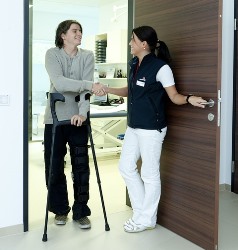How to Enroll In the Right LVN or LPN College Near Cambridge Massachusetts
 Now that you have chosen a rewarding vocation in the field of nursing, it's important that you select a Licensed Practical Nurse (LPN) school near Cambridge MA that will furnish the right instruction. If you reside in Texas or California, then you will be searching for a Licensed Vocational Nurse (LVN) school instead. There is no difference, except for the names, between an LPN and an LVN. They both undertake the same job functions and work in healthcare facilities under the supervision of Registered Nurses (RN) or Doctors. But their responsibilities do fluctuate depending on the state they practice in, which we will look at in the next section. When starting their search for schools, many prospective nursing students begin with those that are the closest to their houses or that are the least expensive. Although price and location are important points to consider, they are not the only qualifications that you should base your selection on. Other concerns, such as if the schools are accredited or have high pass rates on the licensing exam are extremely important as well. There are additional questions that you should ask prospective schools before enrolling in a LPN or LVN course that we will cover later in this article. But to start with, let's have a look at the function of an LPN and what is involved in the education and licensing process.
Now that you have chosen a rewarding vocation in the field of nursing, it's important that you select a Licensed Practical Nurse (LPN) school near Cambridge MA that will furnish the right instruction. If you reside in Texas or California, then you will be searching for a Licensed Vocational Nurse (LVN) school instead. There is no difference, except for the names, between an LPN and an LVN. They both undertake the same job functions and work in healthcare facilities under the supervision of Registered Nurses (RN) or Doctors. But their responsibilities do fluctuate depending on the state they practice in, which we will look at in the next section. When starting their search for schools, many prospective nursing students begin with those that are the closest to their houses or that are the least expensive. Although price and location are important points to consider, they are not the only qualifications that you should base your selection on. Other concerns, such as if the schools are accredited or have high pass rates on the licensing exam are extremely important as well. There are additional questions that you should ask prospective schools before enrolling in a LPN or LVN course that we will cover later in this article. But to start with, let's have a look at the function of an LPN and what is involved in the education and licensing process.
It Only Takes a Few Minutes to Start Your LPN or LVN Career Below
What does an LPN or LVN Do?

Licensed practical nurses (LPNs) perform a number of basic nursing tasks. They work under doctors and registered nurses (RNs) in Cambridge MA medical offices, hospitals, and health care facilities. They also might provide in-home care. LPNs carry out nursing tasks that are more complex than those that completed by nurse's aides but less complex than the duties of an RN. LPNs monitor the health of patients and look for signs that their health is deteriorating or improving. They check vital signs and watch for changes in monitor readings. Licensed Practical Nurses perform basic nursing functions like changing bandages and wound dressings. They comfort patients and make sure basic needs such as food and fluid intake are in order. Licensed practical nurses may also administer medications in some settings depending on institutional and state standards. LPNs work in a variety of health care environments as part of a team that includes doctors, registered nurses, and others. They serve in settings such as hospitals, nursing homes, assisted living facilities, health clinics, and private physician practices. Some also provide health care services at peoples’ homes. Nurses have to be able to stand on their feet for most of the day. They may need to help lift or move patients as well.
LPN and LVN Programs
If you want to become a licensed practical nurse, you must first complete one year of coursework to earn a certificate or a diploma in an accredited LPN/LVN program. Most states have dozens of accredited colleges, technical schools, and hospitals that offer LPN/LVN programs. The first consideration you must make when becoming an LPN is which school you will attend. This can be a difficult choice. When choosing a school, choose one which is accredited by a nationally recognized accrediting agency. One well-known accrediting agency is the Accreditation Commission for Education in Nursing. After satisfying the LPN program coursework and grade requirements laid out by your state’s Board of Nursing, you will be eligible to take the NCLEX-PN, or the National Council Licensure Examination. This exam is mandatory for all LPN/LVN's in the U.S. and can be scheduled through the National Council of State Boards of Nursing.Attending LPN and LVN Online Classes
 Enrolling in LPN programs online is growing into a more in demand way to receive instruction and earn a nursing certificate or degree in Cambridge MA. Certain schools will require attending on campus for part of the training, and virtually all programs require a certain amount of clinical rotation hours carried out in a local healthcare center. But since the rest of the training may be accessed online, this alternative may be a more practical approach to finding the time to attend school for many students. Concerning tuition, a number of online degree programs are less costly than other on campus options. Even supplemental expenses such as for commuting and study materials may be lessened, helping to make education more easily affordable. And a large number of online programs are accredited by U.S. Department of Education recognized organizations. And so if your work and family responsibilities have left you with limited time to pursue your academic goals, perhaps an online LPN training program will make it more convenient to fit a degree into your busy schedule.
Enrolling in LPN programs online is growing into a more in demand way to receive instruction and earn a nursing certificate or degree in Cambridge MA. Certain schools will require attending on campus for part of the training, and virtually all programs require a certain amount of clinical rotation hours carried out in a local healthcare center. But since the rest of the training may be accessed online, this alternative may be a more practical approach to finding the time to attend school for many students. Concerning tuition, a number of online degree programs are less costly than other on campus options. Even supplemental expenses such as for commuting and study materials may be lessened, helping to make education more easily affordable. And a large number of online programs are accredited by U.S. Department of Education recognized organizations. And so if your work and family responsibilities have left you with limited time to pursue your academic goals, perhaps an online LPN training program will make it more convenient to fit a degree into your busy schedule.
What to Ask LPN and LVN Schools
Now that you have decided on obtaining your LPN certificate, and if you will attend classes on campus or online, you can use the following pointers to begin narrowing down your options. As you undoubtedly are aware, there are numerous nursing schools and colleges near Cambridge Ma as well as within Massachusetts and throughout the United States. So it is essential to reduce the number of schools to select from so that you will have a workable list. As we already mentioned, the site of the school and the cost of tuition are most likely going to be the first two things that you will look at. But as we also emphasized, they should not be your sole qualifiers. So before making your final selection, use the following questions to evaluate how your selection compares to the other schools.
- Accreditation. It's a good idea to make sure that the certificate program as well as the school are accredited by a U.S. Department of Education acknowledged accrediting agency. Aside from helping verify that you receive a premium education, it may help in obtaining financial aid or student loans, which are frequently not offered for non-accredited schools near Cambridge Massachusetts.
- Reputation. Visit online rating services to see what the assessments are for all of the LPN schools you are considering. Ask the accrediting agencies for their reviews too. In addition, check with the Massachusetts school licensing authority to determine if there are any complaints or compliance issues. Finally, you can speak with some nearby Cambridge MA healthcare organizations you're interested in working for after graduation and ask what their assessments are of the schools as well.
- Internship Programs. The most effective way to obtain experience as a Licensed Practical Nurse is to work in a clinical setting. Virtually all nursing degree programs require a certain number of clinical hours be completed. A number of states have minimum clinical hour prerequisites for licensing too. Ask if the schools have a working relationship with nearby Cambridge MA community hospitals, clinics or labs and help with the placing of students in internships. Also, it's important that you choose a school that offers clinical training in the type of facility you are most interested in. For example, if you want training and experience in pediatric care, make sure that the school you choose provides adequate clinical rotation in an area Pediatric Hospital.
- Licensing Preparation. Licensing prerequisites for LPNs differ from state to state. In all states, a passing score is required on the National Council Licensure Examination (NCLEX-PN) together with graduation from an approved school. Some states require a certain number of clinical hours be completed, as well as the passing of additional tests. It's essential that the school you are attending not only provides an exceptional education, but also prepares you to meet the minimum licensing requirements for Massachusetts or the state where you will be working.
- Graduation and Job Placement Rates. Find out from the LPN programs you are looking at what their graduation rates are as well as how long on average it takes students to complete their programs. A low graduation rate may be an indication that students were unhappy with the program and dropped out. It's also essential that the schools have high job placement rates. A high rate will not only confirm that the school has a favorable reputation within the Cambridge MA healthcare community, but that it also has the network of relationships to assist students gain a position.
- NCLEX Exam Pass Rate. Once you receive your certificate or diploma, you must sign up for and pass the National Council Licensure Examination for Practical Nurses (NCLEX-PN). Enrolling in a school with at least a 75% pass rate is highly preferred. Lower pass rates may indicate that a school’s program, curriculum or instructors are ineffective in teaching its students. You can find out from the school what their passing rate is for the last 5 years, or request the information from the State Board of Nursing.
Find Out How to Become an LPN or LVN in Cambridge
Choose the Right Cambridge Licensed Vocational Nurse Program
Enrolling in the right Licensed Practical Nurse school is potentially the most critical first step to starting a new career in the healthcare field. There are a number of factors that you should take into account when selecting a nursing school. These variables will be prioritized differently contingent on your current career objectives, lifestyle, and financial status. As we have highlighted within this content, it is critical that you enroll in an LPN school and a certificate or degree program that are each accredited and have excellent reputations within the health care community. By utilizing our list of qualifying questions, you will be able to develop a shortlist of schools to choose from so that you can make your final selection. And with the appropriate degree and training, combined with your hard work and ambition to succeed, you can become a Licensed Practical Nurse in Cambridge Massachusetts.
